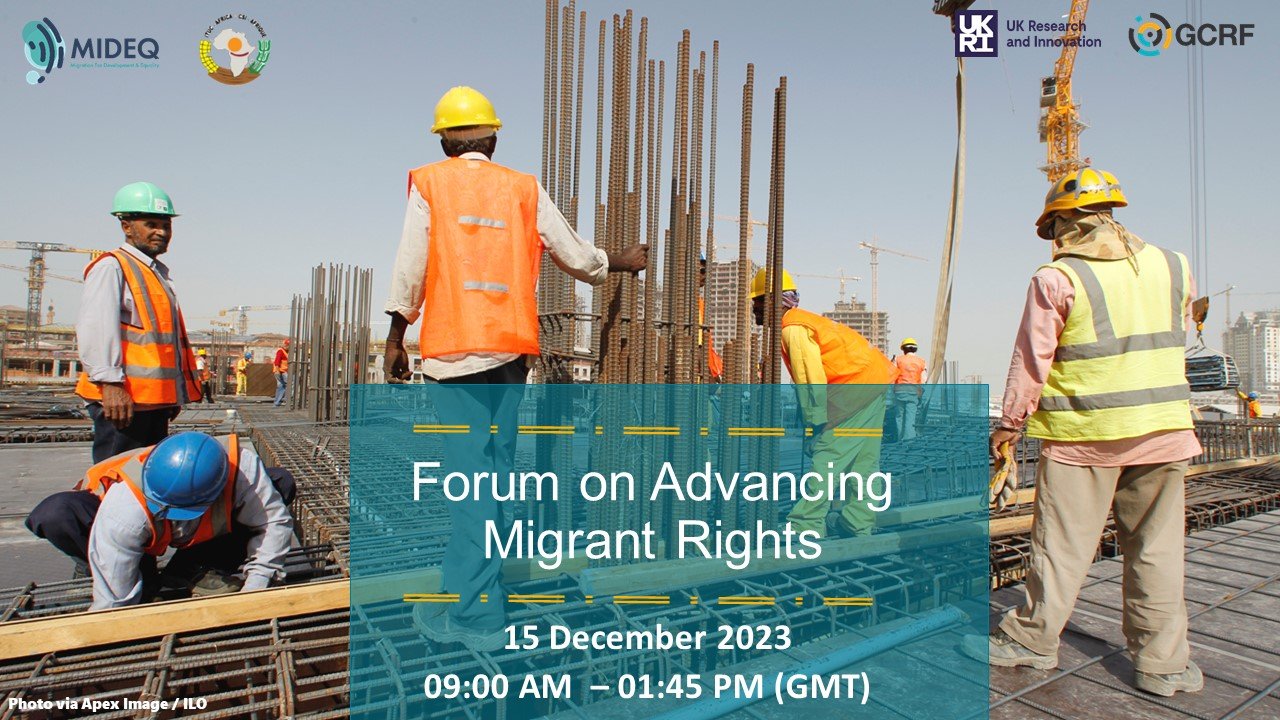
How do migrants organise, mobilise, and build solidarity in the Global South? As ordinary people move, they organise themselves, create channels of solidarity and extend support to each other and to other members of the working and broader subaltern classes. These forms of organising and solidarity take both formal and informal forms and are both visible and not-so-visible. Understanding these dynamics is very important given the fact that South-South migration accounts for the dominant stock of migration and increasingly is becoming a significant factor in the economic and social development of many developing countries. While xenophobia and othering are regular features of migrant-local encounters, the extent to which its opposite – solidarity - occurs because of workplace and community activism of migrants, has received far less attention. How migrants organise themselves and how they relate to locals of similar social standing is important for a nuanced understanding of migrant experiences in the Global South.
MIDEQ’s work on solidarity and political mobilisation identified three main levels at which migrants mobilise to respond to their circumstances or conditions. At the micro-level, while migrants organise largely around individual working conditions and terms of employment, the set of issues that migrants organise around takes a more structural approach at the macro-level where the focus is often on shifting society-wide structures of oppression and discrimination. However, migrants also engage in mobilising and resistive activities that are neither micro nor macro and that may be labelled as meso-level resistance. Our work has shown that meso-level organising, and the solidarity networks formed may provide migrants in the Global South with the space to build solidarity in their own ways and to fight their exploitation and oppression. This is because it provides them with the space to draw on the labour power of the group as a leverage against workplace abuses and unfavourable social conditions. Migrant meso-level organising therefore mirrors social movement unionism in that the issues of production, social reproduction and social participation coalesce. How migrants do these depends on the context in which they find themselves and the set of issues, forms of alliances that they build and the impediments that they confront.
This forum therefore brings together migrants, migrants’ groups, activists, CSOs, trade unions, religious organisations, and researchers who are working to advance the issues faced by migrants as part of larger working and subaltern classes who have to struggle for access to housing, healthcare, education, employment and against discrimination.
This one-day online forum, organised by MIDEQ’s thematic area on political mobilisation and transnational solidarity building, in collaboration with the International Trade Union Confederation Africa (ITUC-Africa) is aimed at sharing lessons, building connections, and fostering solidarity across national, regional, and continental boundaries.
Objectives
- Explore migrant mobilization: Investigate how migrants in the Global South organise, mobilise, and create solidarity networks at micro, meso, and macro levels in response to their circumstances and societal structures.
- Understand solidarity dynamics: Examine the interplay between migrants' formal and informal organizing methods, identifying the visibility and impact of solidarity-building efforts in communities and workplaces.
- Analyse social movements: Delve into the significance of meso-level organizing among migrants, emphasizing its role in providing spaces for solidarity networks and resistance against exploitation and unfavourable conditions.
Outcomes
- Enhanced understanding: Foster a nuanced comprehension of migrant experiences in the Global South and beyond, highlighting their relations with locals and forms of organizing in different contexts.
- Knowledge sharing: Facilitate the exchange of lessons learned, best practices, and challenges faced by migrants, activists, CSOs, trade unions, religious organizations, and researchers working on migrant issues
- Strengthened networks: Promote the establishment of connections and collaborations among diverse stakeholders across national, regional, and continental boundaries for enhanced solidarity and support mechanisms for better migration governance.
Format
Expert Presentation: Experts will make presentations on topical issues to stimulate the discussion.
Panel Discussion: Engage experts, activists, and migrants in panel discussions exploring various aspects of migrant mobilization, solidarity-building, and resistance.
Interactive Session: Conduct interactive session allowing participants to exchange experiences, strategies, and challenges they encounter in their respective contexts.
Participants
- Civil Society Organisations (CSOs) working on migrant issues and human rights.
- Experts including migration researchers from MIDEQ project, University of Ghana and Cape Town, and students from both institutions.
- Migrants and Migrant Groups actively engaged in organising and solidarity initiatives.
- Activists involved in advocating for migrant rights and social justice.
- Trade Unions representing labour interests and supporting migrant workers.
- Religious organisations: Providing aid and support to migrant communities.
- Researchers focused on understanding migration dynamics and so
Concept note and programme
PDF 472,3 Kio
The full programme and concept note can be found here.